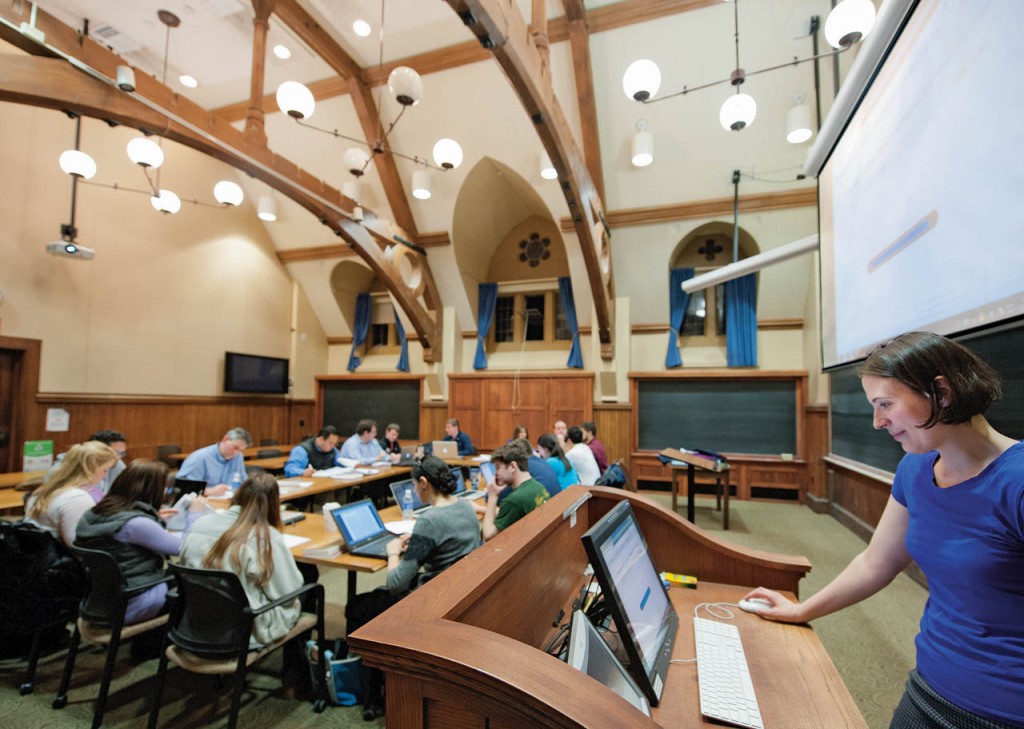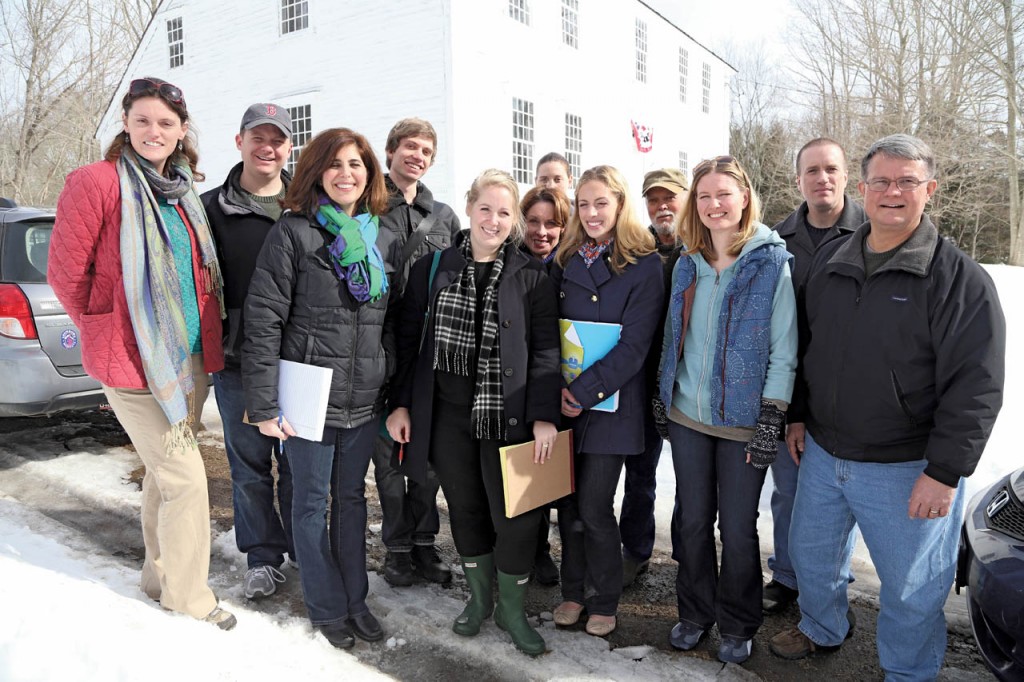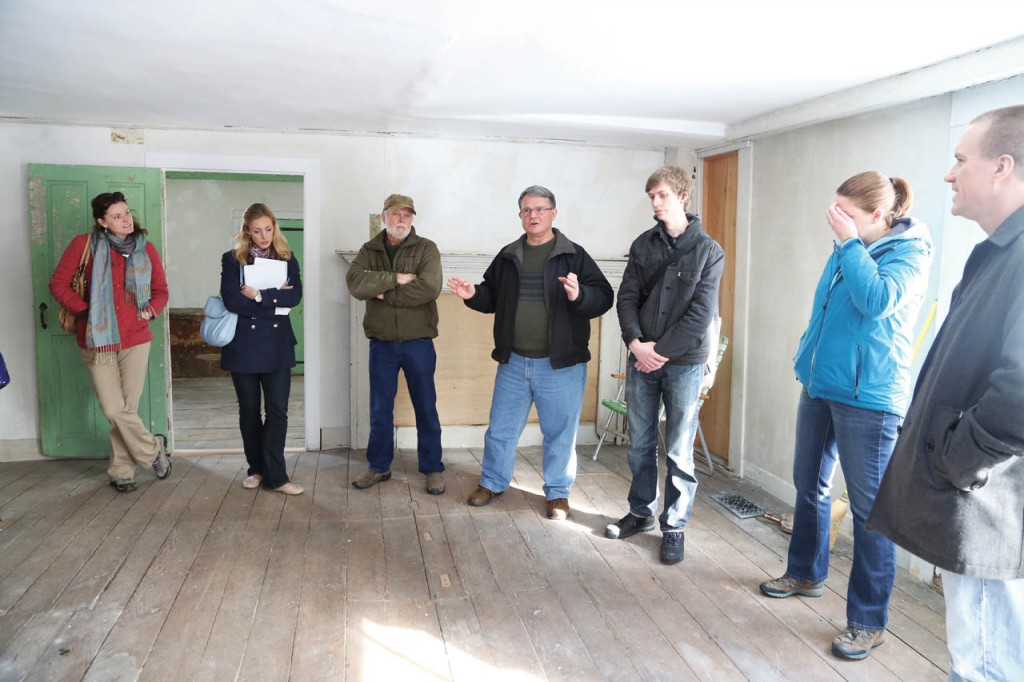College offers innovative graduate studies options
by Rhea Hirshman

Social Science Research and Data Coordinator Rachael Barlow prepares to lecture in “PBPL 806, Methods of Research.”
Photo by Richard Bergen
Working as an actuary for a major insurance company came naturally to Scott Reznick M’12, who had majored in math as an undergraduate. But, as time went on, he began to rethink his career choice. “The work was intellectually challenging,” he says, “but not in a way that felt meaningful.”
Literature, on the other hand, fired his imagination, and he began taking evening courses at another area university, ultimately choosing Trinity’s graduate program in English. “I realized that I wanted literature to be a bigger part of my life,” Reznick says, “not something I paid attention to just one night a week. That conviction grew alongside an equal devotion to education; Trinity’s program was the logical step in transitioning from risk assessor to educator.”
Now, the former insurance professional is pursuing a Ph.D. in English at Boston College, with an eye toward entering academia. “Whether you have to get an M.A. for work or are doing it for yourself,” Reznick says, “Trinity’s program can be intellectually transformative.”
A long history
Trinity’s graduate program offers three areas of study: English (with tracks in literary studies and in writing, rhetoric, and media arts); American studies (with tracks in American cultural studies; museums and communities; and historical perspectives on New England and the nation); and public policy (with tracks in public policy studies and health care policy and a recently implemented track in education policy).
Although its current iteration dates back to the mid-2000s, graduate education at Trinity has a long history. William Barnett, dean of graduate studies, notes that Trinity began offering formal master’s degrees in 1888 and that some departments, such as chemistry, engineering, philosophy, and psychology, offered graduate degrees until the 1980s. Women were admitted to graduate studies beginning in 1927, nearly five decades before the College became coeducational. However, since the 1980s, Trinity has undertaken curricular changes that have resulted in focusing on fewer graduate programs. “Current programs, and those we are considering for the future, embody both our liberal arts mission and service to our local community,” Barnett says. “Working professionals come here because of our reputation for very high quality instruction.”
Furthering careers

Adjunct faculty member Craig Hotchkiss, right, gathers with his “AMST 872: History Museum Education” class at the Huntington Homestead in Scotland, Connecticut, during a February field trip. Others in attendance included Stephen Shaw, second from right, who serves as president of the Connecticut Society of the Sons of the American Revolution, and John Spencer, fourth from right, president of the Huntington Homestead Trust.
Photo by John Atashian
While some, like Reznick, undertake graduate studies with future career change in mind, others do so to enhance prospects or expand horizons in their current careers. Adrienne Fulco, associate professor of public policy and law and director of undergraduate and graduate public policy programs, notes that she has taught police officers, schoolteachers and administrators, journalists, state and local government employees, lawyers, elected officials, and others in both the public and private sectors who want to sharpen their understanding of the policy-making process. “Our students,” she says, “bring their experiences into our discussions of real-world policy issues.”
Christopher Todd M’10, a social studies teacher at Windsor High School, wanted to pursue a graduate degree in public policy both to gain deeper subject knowledge and to support his community involvement as co-chair of the Economic Development Commission for the town of Ellington. He was attracted to Trinity because its graduate programs cater to working professionals in both scheduling and in the diverse backgrounds of the faculty and staff.
“The strength of the program for me,” Todd notes, “was outstanding teaching from professors who balance wide real-world experience with academic expertise.” In his master’s thesis, Todd combined the theoretical with the practical in an examination of ways to produce greater degrees of regionalization for small school districts without loss of local control. “Trinity’s program challenged me,” he says, “to be a stronger learner and a more effective educator both in the classroom and in my community.”
The new health care policy track, created to address an area of national and worldwide concern, attracts students such as Lauren DeLuca, who is working full-time as an eligibility services specialist with the state’s Department of Social Services. As she looks toward advancing in a public-sector career, DeLuca notes that studying health care policy at Trinity is an even more perfect fit than she anticipated when she entered the program in 2012. “So much of what we discuss in the classroom connects directly to my job,” she says. “For instance, dealing with health insurance and the changes occurring with the implementation of the Affordable Care Act are part of my everyday work.” Like Todd, she cites the value of studying with professors who bring both hands-on experience and academic expertise into the classroom–and having a supportive peer group. “Going to school after working a long day can be tiring, but knowing that I’ll be challenged and stimulated makes me look forward to class.”
The American landscape
Mary “Mel” McCombie, visiting associate professor of American studies and associate director of the graduate program in American studies, describes the breadth of the American studies program by noting some of her graduate students’ thesis topics. One studied U.S. gender ideologies as reflected in cookbooks, while others have explored subjects ranging from the art of carousel horses, to the regional impact of railroads, to the history of attitudes toward contraception. And there was the student concerned about not being able to get her work done because she had three weddings to attend that semester. “We decided,” McCombie says, “that the perfect topic for her would be the U.S. wedding-industrial complex. Whatever your academic interest, American studies teaches you always to look at your daily life with a critical eye.”

Craig Hotchkiss, second from right, and John Spencer of the Huntington Homestead Trust, center, join graduate students Laura McCarthy, Emily Russell, and Levin Freudenfeld. Hotchkiss also serves as education manager at The Mark Twain House and Museum in Hartford.
Photo by John Atashian
The tracks offer varying approaches to exploring the American experience. New England and the nation tends to attract historians and history teachers; its unique focus, McCombie says, is using the lens of New England history to examine national issues. The American cultural studies track employs methods and materials from across disciplines to examine American life, with particular attention to the local area.
Those enrolled in the museums and community track receive solid grounding in American studies and research methods and also learn how museums and related institutions actually function. “Museums,” McCombie says, “are no longer just for the cultural elite. They have becomes centers of mass entertainment; they need larger staffs, more volunteers, and broader visions of their roles in their communities. Our graduates are working at museums and related institutions all over the U.S.”
Looking ahead
“Increasingly,” says Barnett, “we are seeing that the master’s degree is the new version of what the bachelor’s degree used to be. With that in mind, we’re constantly assessing how best to meet the needs of our students.”
Milla Riggio, James J. Goodwin Professor of English and co-director of graduate studies in English, notes that the department is exploring the possibility of offering dual degrees that will allow students to work toward both a B.A. and an M.A. simultaneously. Another option under consideration is offering courses to students who might be pursuing an M.A. as a way of gaining credentials to teach in community colleges or secondary schools.
What will not change is what matters most: the quality of the teaching in the best liberal arts tradition. “The most important aspect of Trinity’s program is the faculty,” Reznick says. “The professors I encountered were not just teachers but role models for how to spend one’s life being involved with ideas, while understanding how to engage with the world beyond the classroom.”
